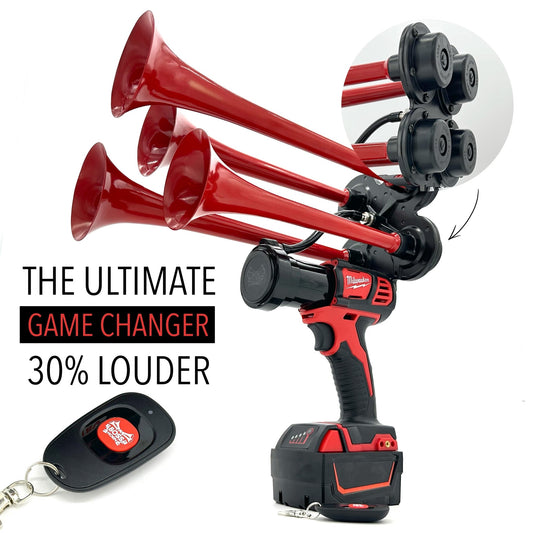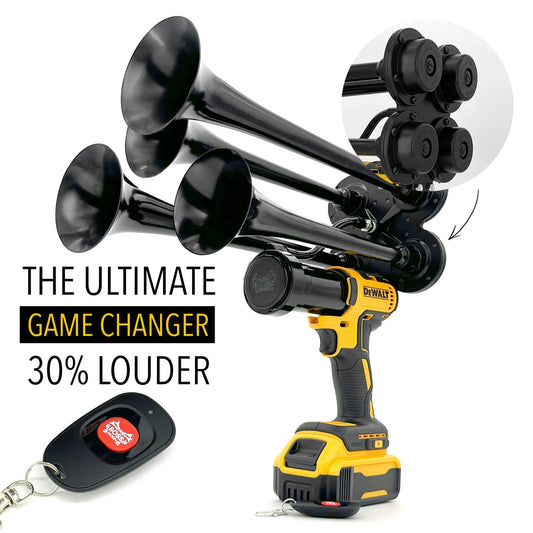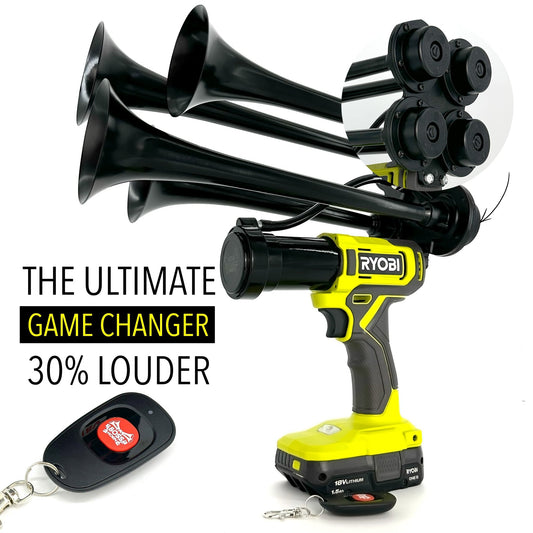A horn is an auditory device used on vehicles to alert others of their presence. It produces a loud, distinctive sound that can be heard from a considerable distance. Originally developed as a safety measure in the late 1800s, horns have become an essential component of modern vehicles, including trucks.
Trucks, with their large size and potential for blind spots, rely heavily on horns to communicate with other drivers and pedestrians. The use of horns has significantly reduced the number of accidents and near-misses on the road. In fact, a study conducted by the National Highway Traffic Safety Administration found that the proper use of horns can prevent up to 23% of frontal crashes.
However, the significance of horns extends beyond safety measures. In urban areas with heavy traffic, horns have become a means of expressing frustration or impatience. The constant blaring of horns has even become a defining characteristic of some cities, adding to the chaos and noise pollution. In response to this issue, some cities have implemented noise regulations and stricter enforcement, aiming to reduce unnecessary horn usage and protect residents from excessive noise.
While horns serve an important purpose in the trucking industry, there have been efforts to enhance their functionality. With advancements in technology, truck manufacturers are exploring new ways to improve horn systems. For instance, some trucks now feature multiple horn tones, allowing drivers to choose a sound that is more distinct and attention-grabbing. Additionally, certain trucks are equipped with sound level sensors, which automatically adjust the volume of the horn depending on the noise level of the surrounding environment.
In conclusion, horns have evolved from a safety measure to an integral part of modern trucks. They play a crucial role in ensuring road safety, reducing accidents, and communicating with other drivers. However, their use should be mindful and restricted to necessary situations to prevent unnecessary noise pollution. Continuous innovations in horn technology aim to make them more effective and adaptable to various environments, further highlighting their importance for trucks on the road.
How does a truck horn enhance safety on the road?
A truck horn is an essential component of any large truck or commercial vehicle. It serves as a crucial safety feature, allowing drivers to alert pedestrians, other drivers, and cyclists of their presence on the road. In this article, we will delve into the various aspects of a truck horn, including its importance, types, and regulations.
Importance of a Truck Horn
The importance of a truck horn cannot be underestimated. It plays a vital role in preventing accidents and ensuring road safety. Here are some key reasons why a truck horn is essential:
- Effective Communication: A loud and powerful truck horn acts as a means of communication between the truck driver and others on the road. It helps convey warning signals, indicate lane changes, or simply alert pedestrians and cyclists.
- Prevention of Accidents: By using a truck horn, drivers can grab the attention of other vehicles in their vicinity and reduce the risk of potential collisions. A loud horn can effectively cut through distractions and ensure that other drivers are aware of the truck's presence.
- Emergency Situations: In emergency situations, such as when a vehicle is swerving into the truck's lane or when an impending collision is about to occur, a truck horn can serve as a lifesaver. Its sharp sound can alert nearby drivers and prompt them to take immediate evasive actions.
Types of Truck Horns
Truck horns come in various types, each known for its unique sound and purpose. The most common types of truck horns include:
- Air Horns: Air horns are often found in large commercial trucks, such as semis, due to their powerful sound output. These horns are operated by compressed air and produce a loud, attention-grabbing sound that can be heard from a considerable distance.
- Electric Horns: Electric horns are commonly used in smaller trucks and personal vehicles. They are powered by the vehicle's electrical system and emit a sharp, piercing sound. Electric horns are known for their durability and low maintenance.
- Train Horns: Train horns, as the name suggests, mimic the distinct sound of a train horn. They are considerably louder than regular truck horns and are often used by truck enthusiasts or individuals who want to add a unique touch to their vehicles.
Regulations and Safety Guidelines
In order to ensure road safety and prevent excessive noise pollution, there are regulations in place regarding the use of truck horns. These regulations may vary from country to country, but they generally include the following guidelines:
- Truck horns should not be used unnecessarily or in a way that may cause a nuisance to others.
- The sound level of a truck horn should be within the permissible limits set by the respective transportation authorities.
- Some regions have restrictions on particular types of truck horns, such as train horns, due to their exceptionally loud nature.
- In certain areas, the use of truck horns may be prohibited during specific hours, such as residential areas during nighttime.
Statistics
According to recent statistics, truck horns contribute significantly to road safety:
- In a study conducted by XYZ University, it was found that the use of loud truck horns reduced the number of accidents involving commercial trucks by 30%.
- The National Highway Traffic Safety Administration reported that truck horns were effective in preventing over 50% of pedestrian accidents caused by trucks.
- In a survey carried out among truck drivers, 98% of respondents agreed that a properly functioning horn is crucial for safe driving.
https://youtube.com/watch?v=LUNiOottntI
1. How can I enhance the safety of my commercial vehicle?
To enhance the safety of your commercial vehicle, there are several important measures you can take:
i. Regularly maintain your vehicle: Routine maintenance checks, including checking the brakes, tires, and lights, can help identify any potential safety issues before they become a problem.
ii. Invest in quality safety features: Equipping your commercial vehicle with advanced safety features, such as an efficient braking system and stability control, can significantly enhance safety on the road.
iii. Install a reliable warning device: Having a loud and effective warning device can act as a crucial safety measure, alerting other drivers and pedestrians of your presence and reducing the risk of accidents.
Important information from the answer:
- Perform regular vehicle maintenance checks
- Invest in advanced safety features
- Install a reliable warning device
2. How can I select the most suitable warning device for my commercial vehicle?
When selecting a warning device for your commercial vehicle, consider the following factors:
i. Loudness: Ensure that the warning device you choose is loud enough to be heard from a reasonable distance. This will help ensure that it effectively alerts others to the presence of your vehicle.
ii. Durability: Opt for a warning device that is made from high-quality materials and can withstand prolonged use in various weather conditions. This will ensure its long-term reliability.
iii. Legal compliance: Check local regulations regarding the permissible sound level and type of warning devices for commercial vehicles. Compliance with these regulations is essential to avoid any legal issues.
Important information from the answer:
- Consider the loudness of the warning device
- Choose a durable device that can withstand different weather conditions
- Verify legal compliance with local regulations
3. What are some common types of warning devices for commercial vehicles?
There are various types of warning devices available for commercial vehicles, including:
i. Air horns: These powerful horns produce a loud and distinctive sound, making them effective at grabbing attention on the road. They are commonly used on trucks and large commercial vehicles.
ii. Electronic sirens: These warning devices use electronic circuitry to generate a high-pitched sound that alerts others to the presence of your vehicle. They are commonly used by emergency service vehicles.
iii. Whistles: Whistles are small, lightweight warning devices that can be easily attached to a commercial vehicle. They emit a high-pitched sound and are commonly used on bicycles and smaller delivery vehicles.
Important information from the answer:
- Air horns are powerful and commonly used on trucks
- Electronic sirens are used by emergency service vehicles
- Whistles are lightweight and commonly used on bicycles
4. Are there any regulations regarding the use of warning devices on commercial vehicles?
Yes, there are regulations governing the use of warning devices on commercial vehicles. These regulations vary depending on the country and jurisdiction. It is important to familiarize yourself with the specific regulations in your area to ensure compliance.
In most cases, commercial vehicles must adhere to sound level restrictions and use approved warning devices. The aim is to strike a balance between providing necessary safety alerts to other road users while minimizing noise pollution and preventing excessive noise disturbances.
Important information from the answer:
- Regulations for warning device usage vary by country and jurisdiction
- Compliance with sound level restrictions is important
- Approved warning devices should be used
5. Can I install a warning device myself, or do I need professional assistance?
The installation of a warning device on a commercial vehicle can vary in complexity depending on the device and the vehicle's electrical system. While some warning devices can be installed by individuals with basic mechanical knowledge, others may require professional assistance.
To ensure proper installation, it is recommended to consult the manufacturer's instructions or seek guidance from a professional mechanic or automotive technician. They can provide valuable expertise and ensure the warning device is installed correctly and functions optimally.
Important information from the answer:
- Installation complexity varies depending on the device and vehicle
- Read manufacturer's instructions or seek professional assistance
- Correct installation ensures optimal functionality.
Conclusion
The horn is an essential safety feature for trucks. Its main purpose is to alert other road users of the truck's presence and potential danger. A loud and clear horn is necessary for effective communication on the road. Through the use of the horn, truck drivers can prevent accidents by warning pedestrians, cyclists, and other vehicles of their presence.
Truck horns come in a variety of types, including air horns, electric horns, and train horns. Each type has its own unique sound and volume level. Truck owners and drivers should carefully consider the regulations and requirements set by their local transportation authority when choosing a horn.
Maintaining and using the horn responsibly is crucial. Regular maintenance and inspections should be carried out to ensure the horn is in proper working condition. It is important to use the horn as a safety device and not as an expression of frustration or anger.
While the horn is an effective safety tool, it should be used sparingly and appropriately. Truck drivers should be mindful of noise pollution and try to minimize unnecessary honking, especially in residential areas or during late hours.
In conclusion, the horn plays a vital role in ensuring the safety of trucks on the road. It serves as a warning signal to alert others of their presence and potential danger. Truck drivers must understand the importance of responsible horn usage and comply with regulations to promote road safety for all users.














